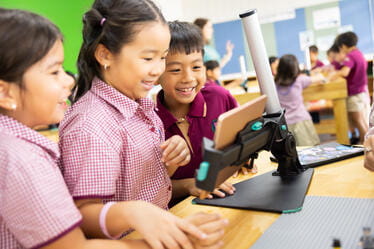Physical activity to promote emotional and social wellbeing As we continue our virtual school experience, the importance of creating suitable opportunities to engage with physical activity has become even more important.
Physical activity has always been important in schools, not just because it promotes a healthy lifestyle, hugely important in itself of course, but because it helps ensure that children receive a rounded education. Research has also shown just how important physical activity is for maintaining a positive emotional and social mindset, particularly during times of stress and anxiety.
As we continue our virtual school experience, the importance of creating suitable opportunities to engage with physical activity has become even more important.
The evidence is clear, children that move more every day have improved physical health, increased brain function and cognition and are less likely to suffer from health issues later on in life. With inactivity now one of the biggest underlying issues that our children face in the modern world, there has never been a greater need to help all children and young people achieve more movement each day, whilst reducing the amount of time they spend sitting down.
Physical Health
Physical activity is not just about aerobic capacity and muscle size. Yes, it can improve your physical health and your physique, but especially during times of stress, regular activity will improve your sense of well-being. It is proven to help you to feel more energetic throughout the day, sleep better at night, sharpen your memories, and feel more relaxed and positive about yourself and the situation.
Research indicates that modest amounts of exercise can really make a difference. No matter your age or fitness level, you can learn to use exercise as a powerful tool to feel better.
Because home working often lacks the formal routine of the school environment, it is really important to build physical activity into your own schedule. In addition to the Physical Education activities being set by your child’s teachers, perhaps you could also encourage active breaks, even 60 seconds of activity could help!
Emotional Health
Emotional health is another area in which physical activity can begin to improve outcomes. In the face of external pressures such as low self-esteem and social pressures, the introduction of sports and Physical Education can play a pivotal role in improving their happiness and state of mind.
Let’s take anxiety as an example: Exercise is a natural and effective anti-anxiety treatment. It relieves tension and stress, boosts physical and mental energy, and enhances well-being through the release of endorphins. Anything that gets you moving can help.
Since the body and mind are so closely linked, when your body feels better so, too, will your mind. If you really pay attention to your movements, you will reap even greater benefits. Try to notice the sensation of your feet hitting the ground, for example, or the rhythm of your breathing. By adding this mindfulness element—really focusing on your body and how it feels as you exercise —you’ll not only improve your physical condition faster, but you may also be able to interrupt the flow of constant worries running through your head.
Social Wellbeing
With the increased use of technology and social media, children’s social wellbeing is becoming a central issue to their overall health and happiness. Normally, the advice would be to encourage children to find a team to play sport with or to go for a walk with a friend, however, whilst that is not possible due to the rules around physical distancing we have to find new ways to address the challenge.
One thing that is important to remember though is that families who are active and play together will build better connections and relationships that will ultimately benefit their social wellbeing.
Exercising with a friend or loved one, will not only make exercising more fun and enjoyable, but it can also help motivate you to stick to a workout routine. You’ll also feel better than if you were exercising alone. In fact, particularly during this period of physical distancing, the companionship is just as important as the exercise.
Related Links








.jpg?h=667&iar=0&w=1000&rev=e9ca63bf8e4d449d9a9d3cea9f6158a5&hash=D43C4ED7C1708B4FDC96905CE2F68D6F)